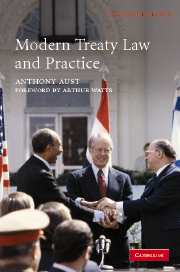Book contents
- Frontmatter
- Contents
- Foreword to the first edition by Sir Arthur Watts
- Preface to the second edition
- Articles of the Convention cited in the text
- Table of treaties
- Table of MOUs
- Table of cases
- Glossary of legal terms
- List of abbreviations
- Introduction
- 1 Vienna Convention on the Law of Treaties 1969
- 2 What is a treaty?
- 3 MOUs
- 4 Capacity to conclude treaties
- 5 Full powers
- 6 Adoption and authentication
- 7 Consent to be bound
- 8 Reservations
- 9 Entry into force
- 10 Treaties and domestic law
- 11 Territorial application
- 12 Successive treaties
- 13 Interpretation
- 14 Third states
- 15 Amendment
- 16 Duration and termination
- 17 Invalidity
- 18 The depositary
- 19 Registration and publication
- 20 Dispute settlement and remedies
- 21 Succession to treaties
- 22 International Organisations
- 23 Drafting and final clauses
- Appendices
- Index
15 - Amendment
- Frontmatter
- Contents
- Foreword to the first edition by Sir Arthur Watts
- Preface to the second edition
- Articles of the Convention cited in the text
- Table of treaties
- Table of MOUs
- Table of cases
- Glossary of legal terms
- List of abbreviations
- Introduction
- 1 Vienna Convention on the Law of Treaties 1969
- 2 What is a treaty?
- 3 MOUs
- 4 Capacity to conclude treaties
- 5 Full powers
- 6 Adoption and authentication
- 7 Consent to be bound
- 8 Reservations
- 9 Entry into force
- 10 Treaties and domestic law
- 11 Territorial application
- 12 Successive treaties
- 13 Interpretation
- 14 Third states
- 15 Amendment
- 16 Duration and termination
- 17 Invalidity
- 18 The depositary
- 19 Registration and publication
- 20 Dispute settlement and remedies
- 21 Succession to treaties
- 22 International Organisations
- 23 Drafting and final clauses
- Appendices
- Index
Summary
I must make amends.
The amendment of treaties is of infinitely more concern than any question of their possible invalidity (Chapter 17). A subject of great practical importance, amendment always needs to be thought about seriously when drafting a multilateral treaty: afterwards is just too late. Although amending a bilateral treaty is not technically difficult, amending a multilateral treaty can raise a multitude of problems, both technical and political. In domestic law, most contracts are between two parties and are relatively short term. In contrast, a multilateral treaty may have as many as 190 or so parties, and be of unlimited duration. These factors lead to three basic problems. First, the process of agreeing on amendments and then bringing them into force can be as difficult as negotiating and bringing into force the original treaty, and sometimes even more troublesome. Secondly, because of their long life, multilateral treaties are more likely to need amendment. Thirdly, because of an inadequate amendment provision (or indeed no provision) in the original treaty, most amendments do not bind all the parties.
Before that watershed, the Second World War, treaty amendment usually required unanimity. It was relatively rare for a multilateral treaty to have a built-in amendment procedure, and when it did, the procedure would normally incorporate the unanimity rule. But, because of the difficulty of obtaining unanimity, a practice gradually developed by which amendments entered into force between only those states willing to accept them.
- Type
- Chapter
- Information
- Modern Treaty Law and Practice , pp. 262 - 276Publisher: Cambridge University PressPrint publication year: 2007



